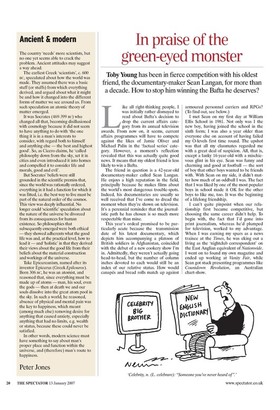Ancient & modern
The country 'needs' more scientists, but no one yet seems able to crack the problem. Ancient attitudes may suggest a way ahead.
The earliest Greek 'scientists', c. 600 BC, speculated about how the world was made. They assumed there was a basic stuff (or stuffs) from which everything derived, and argued about what it might be and how it changed into the different forms of matter we see around us. From such speculation an atomic theory of matter emerged.
It was Socrates (469-399 BC) who changed all that, becoming disillusioned with cosmology because it did not seem to have anything to do with `the one thing it is in a man's interests to consider, with regard both to himself and anything else — the best and highest good'. So, as Cicero claims, he 'called philosophy down from the sky, set it in cities and even introduced it into homes and compelled it to consider life and morals, good and evil'.
But Socrates' beliefs were still grounded in the scientific premiss that, since the world was rationally ordered, everything in it had a function for which it was fitted, i.e. the best way to live must be part of the natural order of the cosmos. This view was deeply influential. No longer could 'scientific' speculation about the nature of the universe be divorced from its consequences for human existence. So philosophies that subsequently emerged were both ethical — they showed adherents what the good life was and, at the practical level, how to lead it — and 'holistic' in that they derived their views about the good life from their beliefs about the material construction and workings of the universe.
Take Epicureanism, named after its inventor Epicurus (Greek Epikouros). Born 306 BC, he was an atomist, and reasoned that, since everything must be made up of atoms — man, his soul, even the gods — then at death we and our souls dissolve into the great atom pool in the sky. In such a world, he reasoned, absence of physical and mental pain was the key to happiness, which meant (among much else) removing desire for anything that caused anxiety, especially anything that had no limits, e.g. wealth or status, because these could never be satisfied.
In other words, modern science must have something to say about man's proper place and function within the universe, and (therefore) man's route to happiness.






















































 Previous page
Previous page